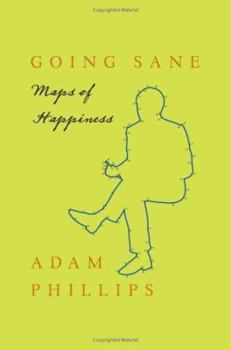Going Sane: Maps of Happiness
Select Format
Select Condition 
Book Overview
Writings on madness fill entire libraries, but until now nobody has thought to engage exclusively with the idea of sanity; we define it simply as that bland and nebulous state of not being mentally ill. But what is sanity? How broad, how eccentric is its range of behavior? And how do we go about crafting a creative and fluid definition of a sane existence, one we can guide ourselves by? Madness is always present in our lives -- in the chaos of our experience as babies, the rebellion of our adolescence, the irrational nature of our sexual appetites. In a society governed by indulgence and excess, madness is the state of mind we identify with most keenly -- while it is ultimately destructive, we often credit it as the wellspring of genius, individuality, and self-expression. Sanity, on the other hand, confounds us; it lacks the false allure of madness. Hamlet, as Adam Phillips points out, is glamorous, while the eminently sane Polonius comes off as a fool. In Going Sane , Phillips redresses this historical imbalance, drawing deeply on literature and his rich experience as a clinician. He strips our lives back to essentials, focusing on how we -- as human beings, as parents, as lovers, as people to whom work matters -- can make space for a sane and well-balanced attitude to living. Phillips's brilliantly incisive and aphoristic style coaxes us into meeting his ideas halfway, and making them our own. In a world saturated by tales of dysfunction and suffering, he offers a way forward that is as down-to-earth and realistic as it is uplifting and hopeful.
Format:Hardcover
Language:English
ISBN:0007155395
ISBN13:9780007155392
Release Date:October 2005
Publisher:Harper
Length:224 Pages
Weight:0.90 lbs.
Dimensions:0.8" x 5.5" x 8.3"
Customer Reviews
1 rating
Thought-provoking
Published by Thriftbooks.com User , 19 years ago
While, on the surface, this book is pretty self-evident and an interesting read, I have to admit that I have found myself thinking about the ideas presented here long after putting down the book. This, to me, is the sign of a surpising and really good book with worthwhile ideas. The ideas in this book provide the antidote to all the naysayers who claim that psychotherapy and the recovery and new-age movements all need to pathologize the human condition. My problem with all the critics is that they often don't offer any real solution. Phillips' book starts this discussion with an eye for the direction that psychotherapy should be heading.






